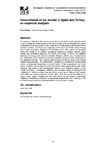Determinants of tax morale in Spain and Turkey: an empirical analysis

Ver/
Use este enlace para citar
http://hdl.handle.net/2183/23372Coleccións
Metadatos
Mostrar o rexistro completo do ítemTítulo
Determinants of tax morale in Spain and Turkey: an empirical analysisAutor(es)
Data
2014Cita bibliográfica
Bilgin, C. (2014). Determinants of tax morale in Spain and Turkey: an empirical analysis. European Journal of Government and Economics, 3(1), 60-74. https://doi.org/10.17979/ejge.2014.3.1.4297
Resumo
[Abstract] Tax morale is defined as the intrinsic motivation to pay taxes, and is closely related to tax compliance. Determinants of tax morale need to be investigated for a more comprehensive understanding of tax compliance. In this paper, determinants of tax morale in Turkey and Spain are analysed on the basis of World Values Survey data. Firstly, descriptive statistics of the variables used in the models are provided. Since tax morale is an ordered categorical dependent variable, ordered probit models are estimated separately for Turkey and Spain to derive the relations between tax morale and relevant variables. Marginal effects are computed since the coefficients of the models cannot be interpreted because of the nonlinearity of the estimated models. The marginal effects related to the top level of tax morale category are presented. The independent variables are combined by demographic factors, employment categories, economic status of the respondents and social capital variables. The findings from the estimated model suggest that social capital variables and some of the demographic factors have important effects on tax morale in Turkey. Confidence variables have positive effects; if taxpayers feel confidence in political entities they are willing to pay taxes. Religion and national pride affect tax morale positively. On the other hand, the results are different for Spain; social capital variables do not have effects on tax morale. Specifically, confidence variables are found to be statistically insignificant. Age, education level and the income level have significant effects on tax morale in Spain.
Palabras chave
Tax morale
Tax evasion
Ordered probit
Tax evasion
Ordered probit
Versión do editor
Dereitos
Atribución 4.0 España
ISSN
2254-7088






